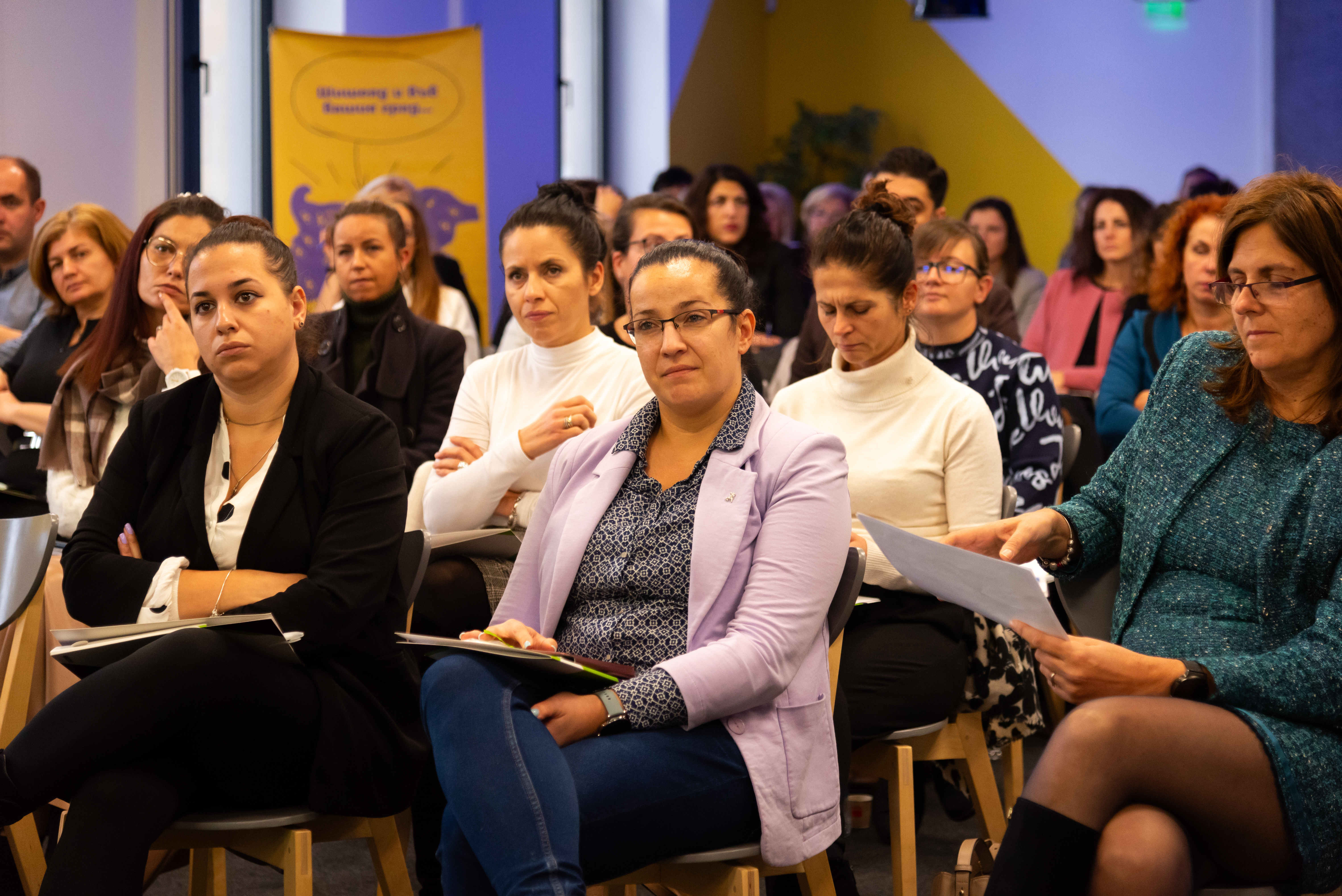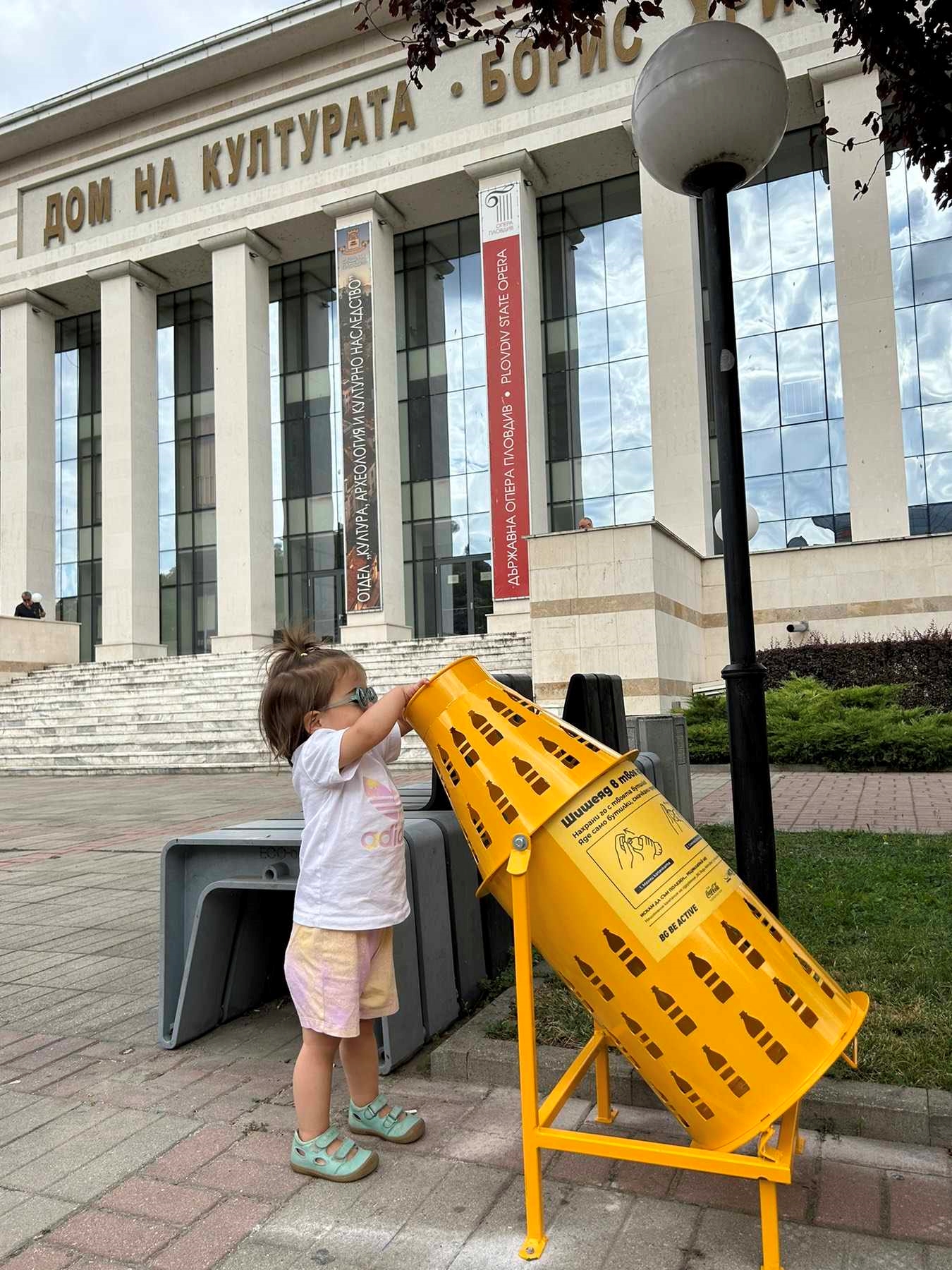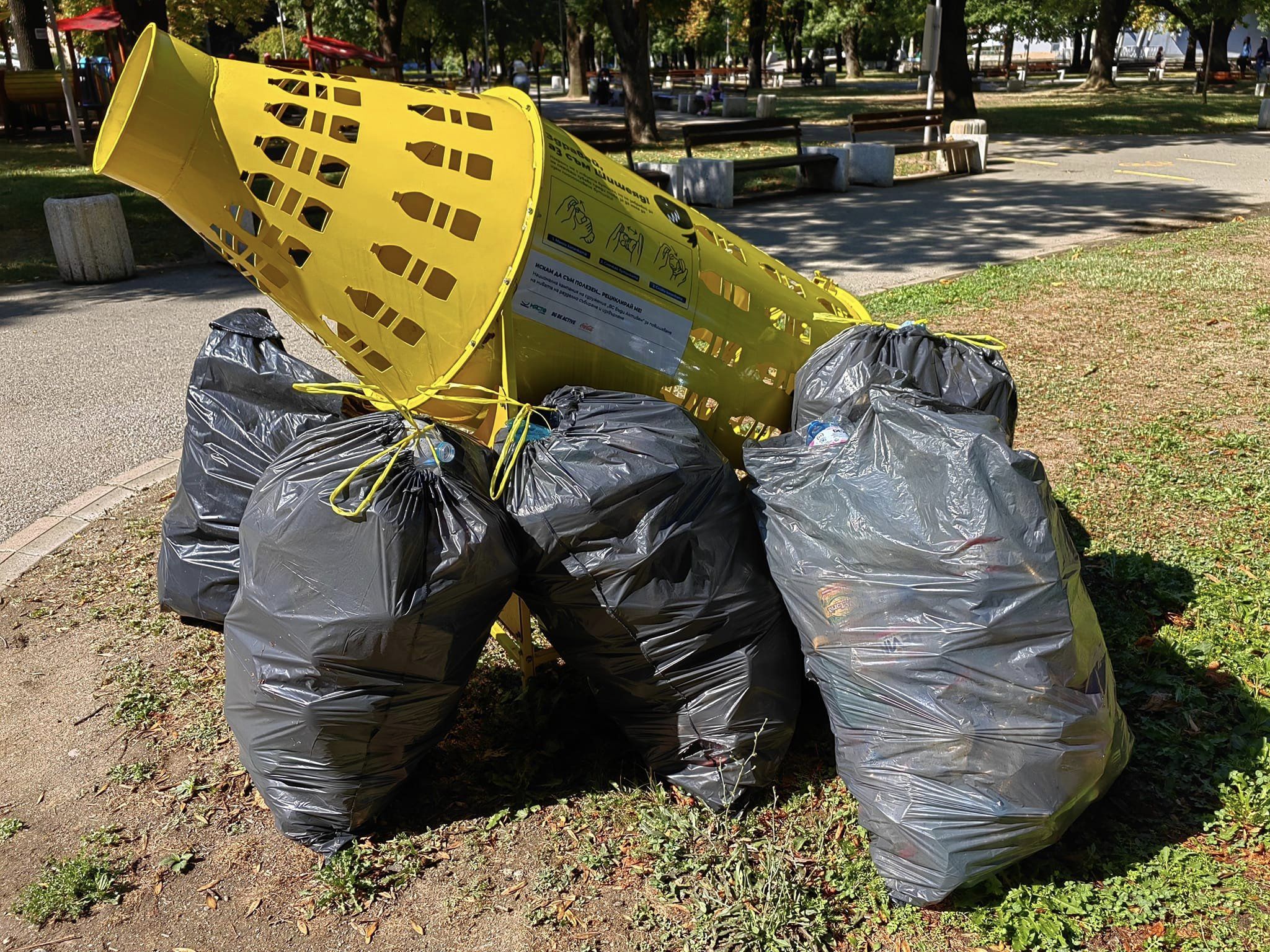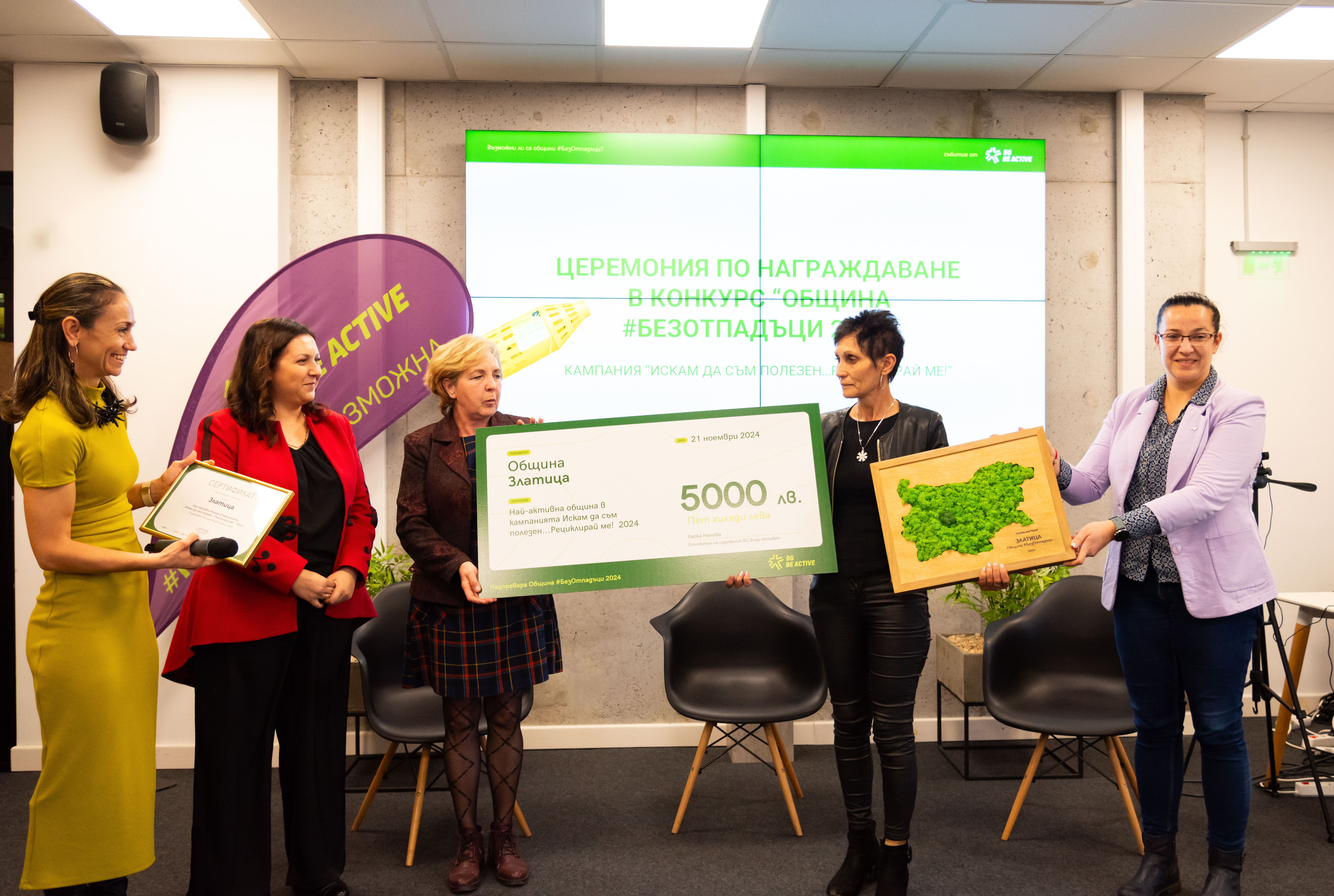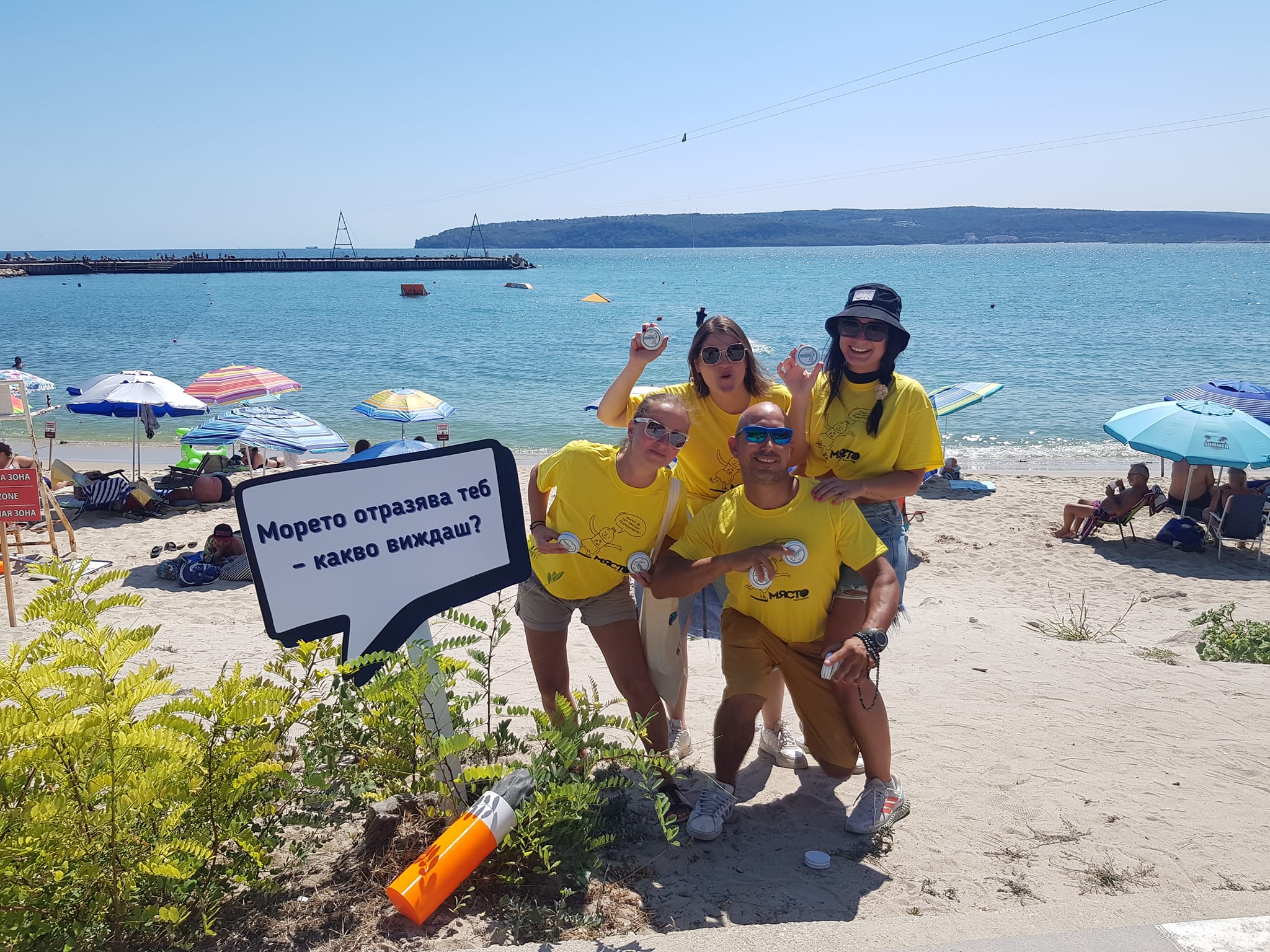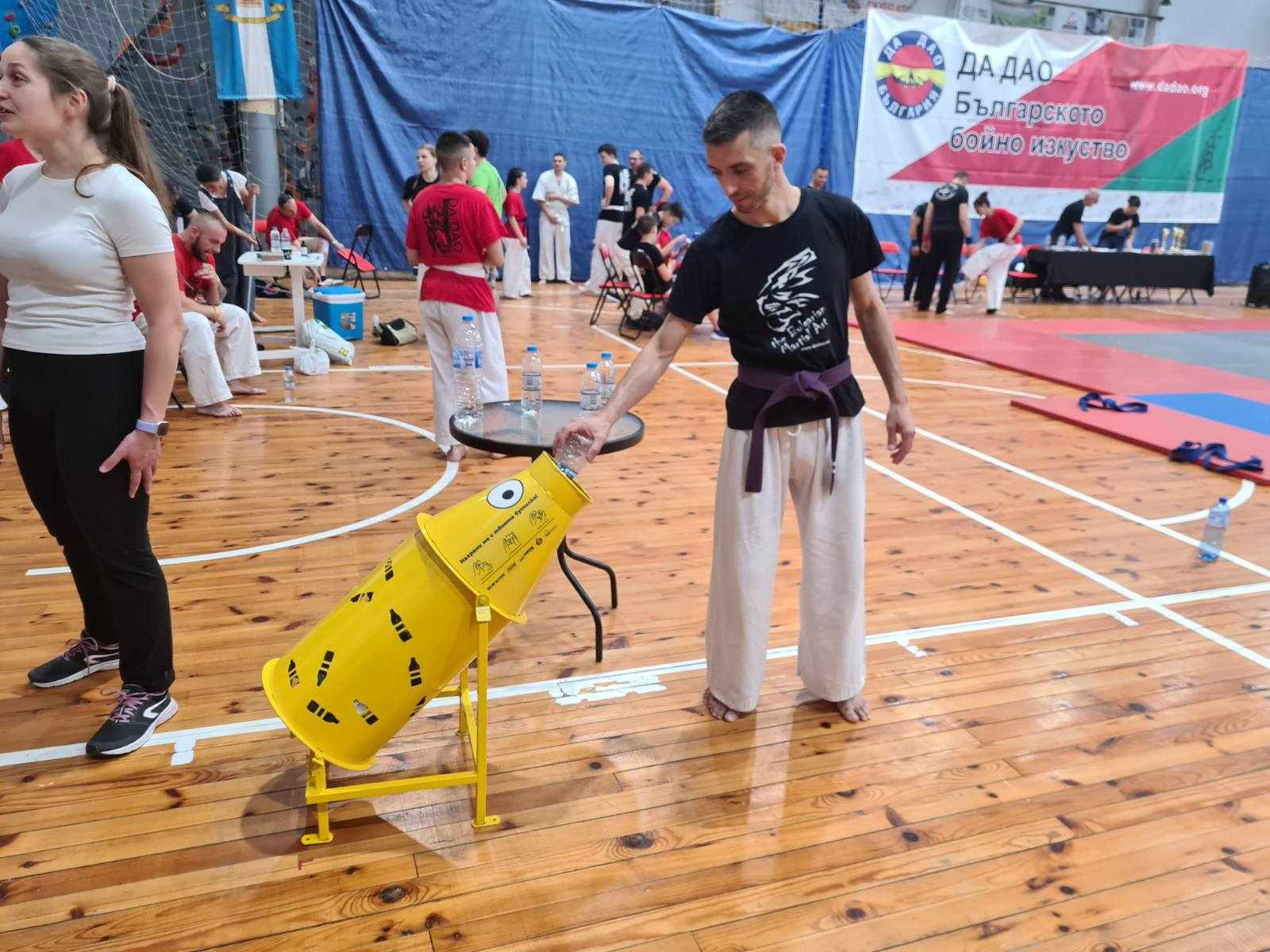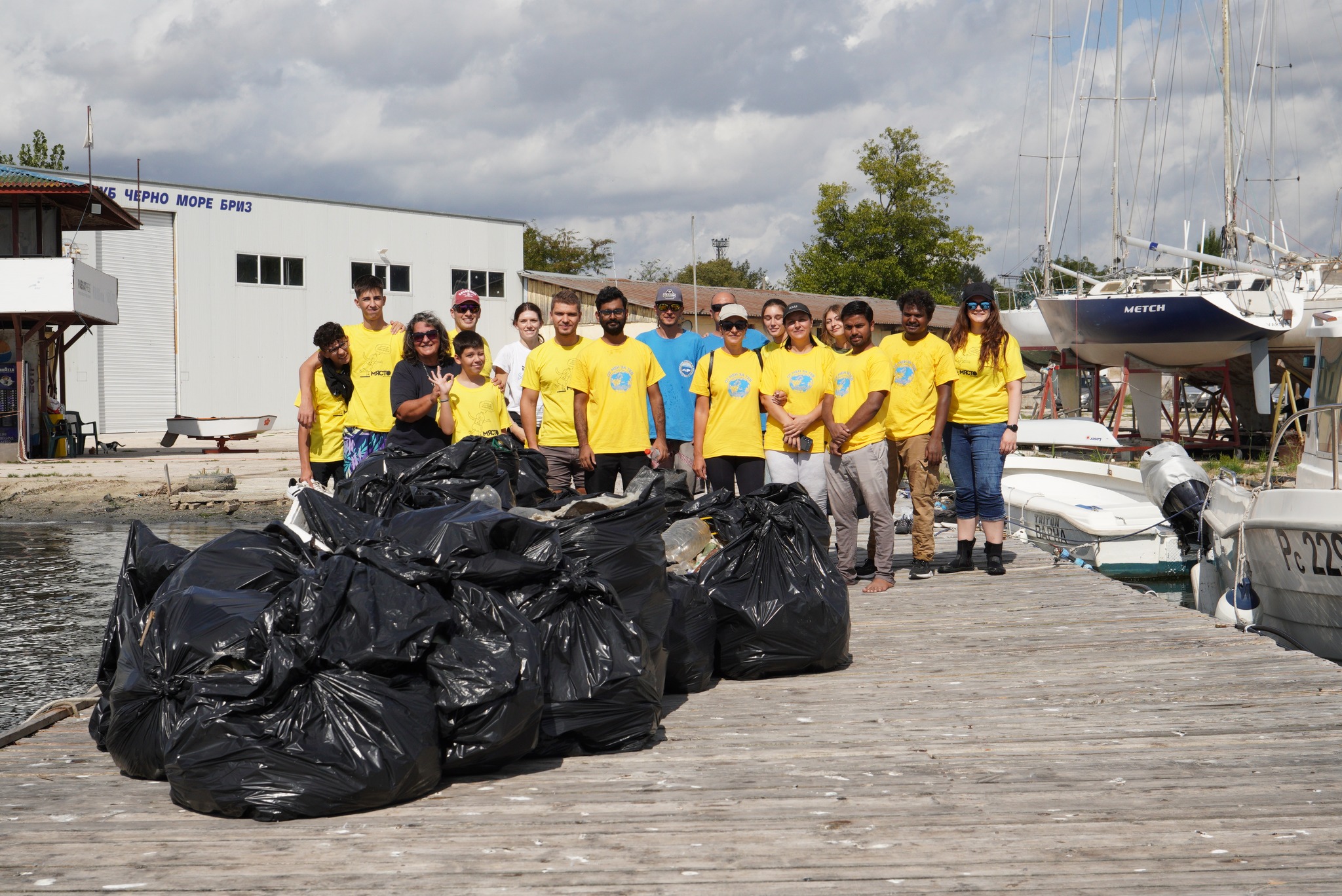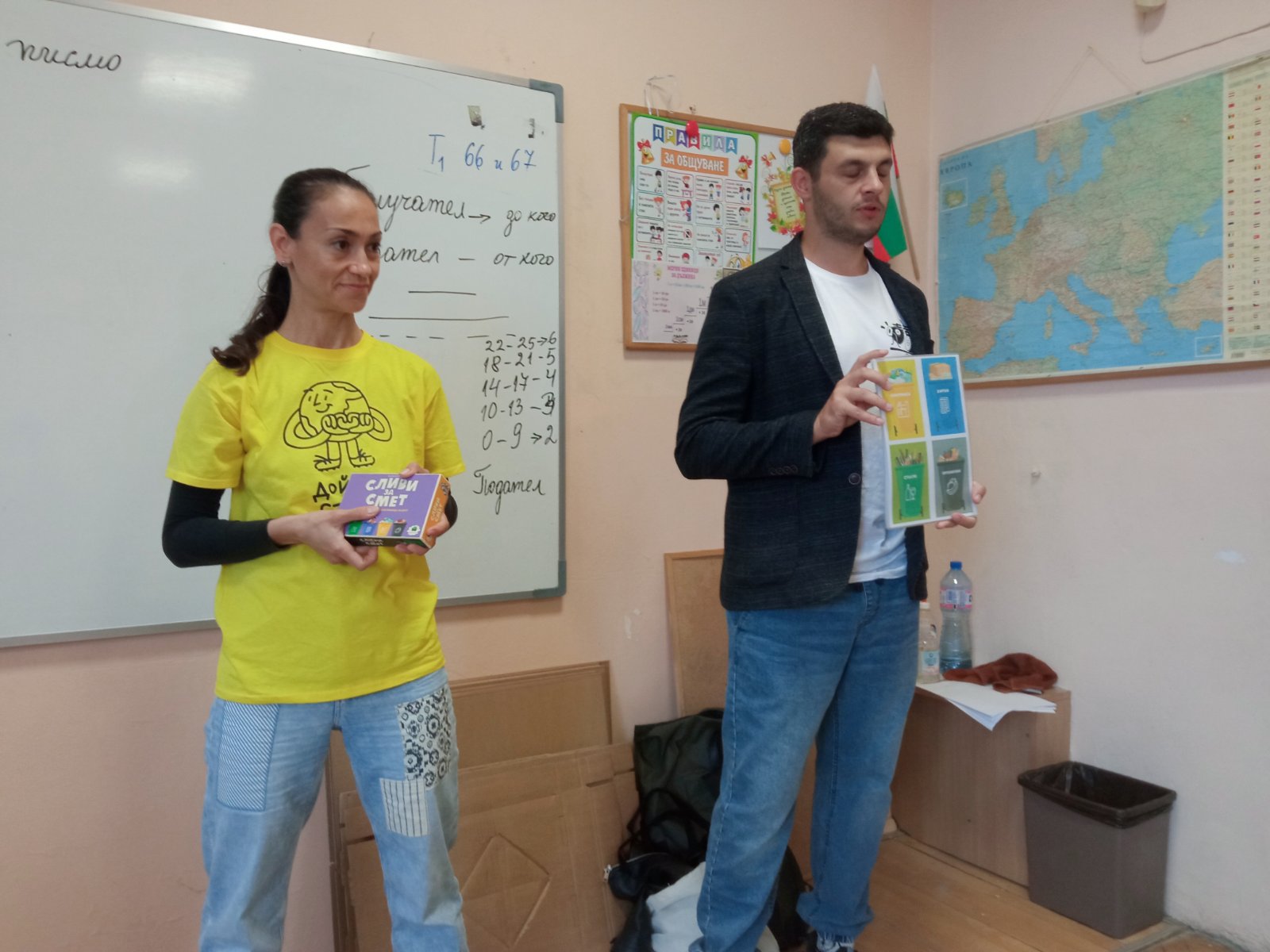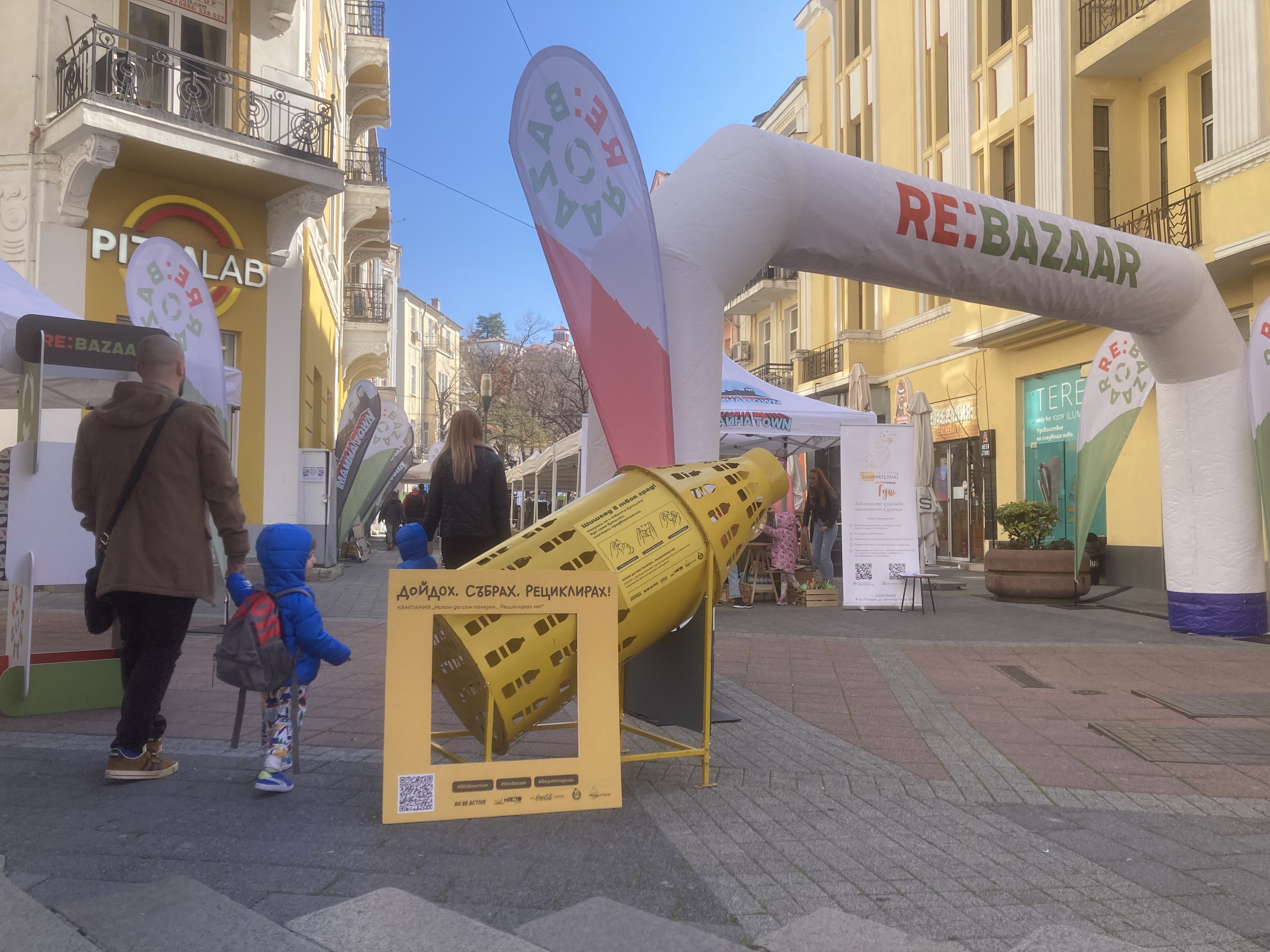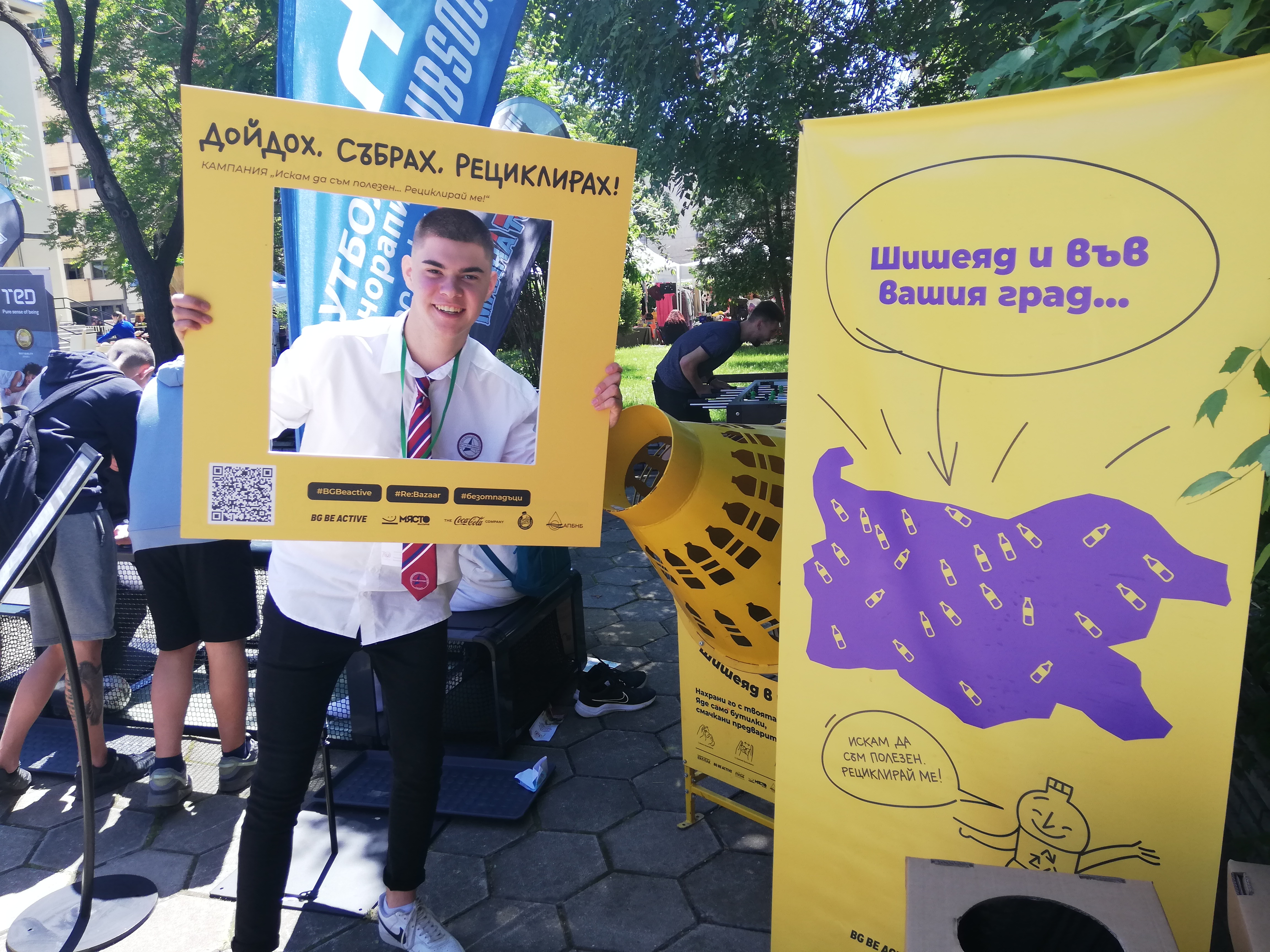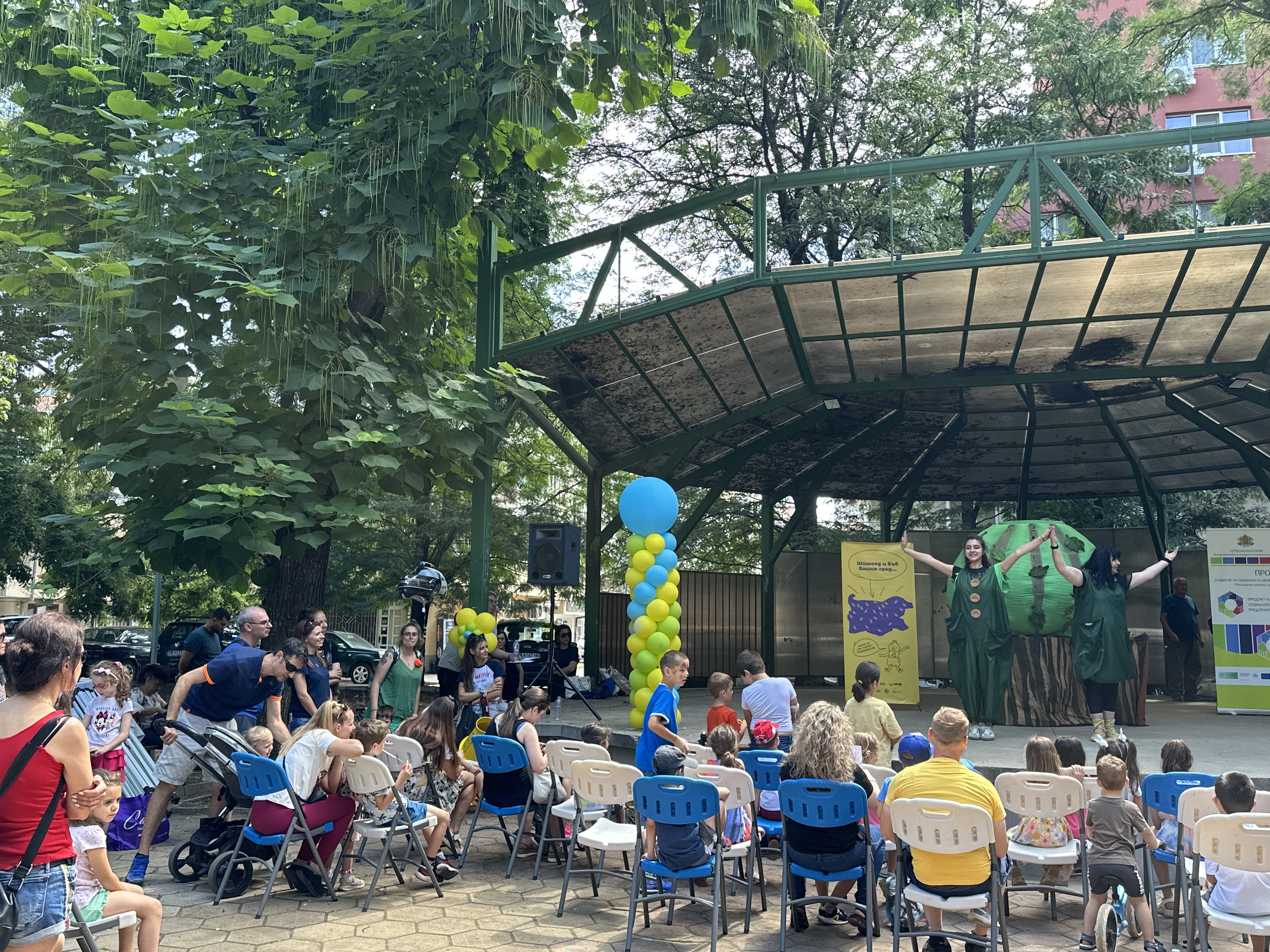Shaping a circular industrial ecosystem and supporting life-cycle thinking
I want to be useful...recycle me!
I want to be useful...recycle me!
"I Want to Be Useful...recycle Me" is a long-term program designed to address Bulgaria's lagging performance in recycling municipal and packaging waste, particularly plastic. Through patented Bottle-Eater installations, clean-up actions, and art and behavioral nudges, the project makes separate collection accessible, interactive, and impactful. With 844,885 participants and 533,500 kg of waste removed, over 5 years, the initiative is proving that small actions can lead to big changes.
Bulgaria
National
It addresses urban-rural linkages
It refers to other types of transformations (soft investment)
Yes
2024-12-02
No
No
No
As a representative of an organisation
"I Want to Be Useful...Recycle Me" is a program designed to address Bulgaria's lagging performance in recycling municipal and packaging waste, particularly plastic. Grounded in BGBA’s nationally representative research and EU recommendations (52023DC0304), the project employs a multifaceted approach combining strong community engagement, enabling recycling in small settlements through creative infrastructure equipment based on behavioral theory and nudging.
Key Objectives:
- Preventing littering of public spaces through behavior change interventions and activations
- Increasing recycling levels by enhancing waste collection infrastructure, with a focus on underserved small settlements.
- Beautifying public spaces via placemaking, nudging a sense of belonging and community pride.
Key strategies of implementation
- Collaborating with municipalities to enhance waste collection infrastructure, especially in smaller settlements under 10,000 people;
- Partnering with recycling haulers to measure campaign effectiveness and ensure regular clean-up of new installations.
- Advising large event organizers on hosting #withoutwaste events.
- Activating communities through targeted clean-up and collection events.
- Utilizing digital communication to encourage consistent waste separation.
Cumulative achievements of the program (2019-2024):
- Cleaned 188 illegal dumping sites, including beaches, forests, and parks, collecting over 533,500 kg of waste.
- Through collaboration with municipalities, 148 installations were strategically placed, leading to a increase in plastic waste collection in target areas capturing 162,010 kg of plastic for recycling.
- Through collaboration with communities, citizens and CSO we activated 67 placemaking sites, transforming public spaces into hubs of environmental engagement.
- Engaged 5,826 volunteers and directly involved 844,885 participants in events and initiatives.
- 23.7 million reach of the media efforts
Key Objectives:
- Preventing littering of public spaces through behavior change interventions and activations
- Increasing recycling levels by enhancing waste collection infrastructure, with a focus on underserved small settlements.
- Beautifying public spaces via placemaking, nudging a sense of belonging and community pride.
Key strategies of implementation
- Collaborating with municipalities to enhance waste collection infrastructure, especially in smaller settlements under 10,000 people;
- Partnering with recycling haulers to measure campaign effectiveness and ensure regular clean-up of new installations.
- Advising large event organizers on hosting #withoutwaste events.
- Activating communities through targeted clean-up and collection events.
- Utilizing digital communication to encourage consistent waste separation.
Cumulative achievements of the program (2019-2024):
- Cleaned 188 illegal dumping sites, including beaches, forests, and parks, collecting over 533,500 kg of waste.
- Through collaboration with municipalities, 148 installations were strategically placed, leading to a increase in plastic waste collection in target areas capturing 162,010 kg of plastic for recycling.
- Through collaboration with communities, citizens and CSO we activated 67 placemaking sites, transforming public spaces into hubs of environmental engagement.
- Engaged 5,826 volunteers and directly involved 844,885 participants in events and initiatives.
- 23.7 million reach of the media efforts
Cross-sector partnerships
circularity
Environmental stewardship
Preventing plastic waste leakage in the environment
Behaviour change
"I want to be usefu...lrecycle me!" addresses sustainability by tackling Bulgaria’s recycling challenges and aligning with EU Green Deal objectives to reduce waste leakage and promote circularity. Through partnerships with recycling haulers reintegrates collected clean plastic into production cycles, contributing to the circular economy. Over five years, the program has expanded from a single-city initiative in Plovdiv to a national-level model, installing 148 patented Bottle-Eater installations across 67 settlements. These installations, made of durable and recyclable materials, have captured 162,010 kg of plastic, reinforcing waste separation at the source and ensuring accessibility for communities previously excluded from effective recycling systems.
Through community activation we have cleaned 188 illegal dumping sites, including nature parks, beaches, and water bodies, removing over 533,500 kg of waste and significantly improving local biodiversity. Eight Black Sea coastal and underwater cleanups have directly lessened plastic pollution in fragile ecosystems. The community-driven approach has engaged 5,826 volunteers and directly involved 844,885 participants, driving a strong shift toward more sustainable behaviors. Behavior change campaigns, coupled with digital and traditional communication strategies, have a reached of over 23.7 million showcasing a widespread awareness of recycling’s environmental benefits.
Exemplary traits
By integrating infrastructure, education, and community action, the project exemplifies a sustainable, scalable approach to circular waste management, proving how a locally initiated effort can expand into a nationwide movement with lasting impact.
Through community activation we have cleaned 188 illegal dumping sites, including nature parks, beaches, and water bodies, removing over 533,500 kg of waste and significantly improving local biodiversity. Eight Black Sea coastal and underwater cleanups have directly lessened plastic pollution in fragile ecosystems. The community-driven approach has engaged 5,826 volunteers and directly involved 844,885 participants, driving a strong shift toward more sustainable behaviors. Behavior change campaigns, coupled with digital and traditional communication strategies, have a reached of over 23.7 million showcasing a widespread awareness of recycling’s environmental benefits.
Exemplary traits
By integrating infrastructure, education, and community action, the project exemplifies a sustainable, scalable approach to circular waste management, proving how a locally initiated effort can expand into a nationwide movement with lasting impact.
One major way of bringing aesthetics in a topic usually considered - ugly and smelly are the Bottle-Eater installations. With their distinctive design and bright yellow color, they serve as recognizable landmarks that make separate disposal more accessible and inviting. Positioned in parks, pedestrian streets, and high-traffic public spaces, these installations do more than collect plastic—they enhance urban environments by introducing interactive, well-integrated elements that encourage sustainable behaviors.
Since the beginning, 67 public spaces have been revitalized through the integration of the Bottle-Eaters, turning previously overlooked areas into points for environmental engagement. The installations have become points of interest, points of communication and social nudging reinforcing their role in cultural transformation. Additionally, a wide range of community activities and events nudging a sense of collective responsibility, aligning with NEB's value of creating beautiful connections across contexts were organized.
Additionally through the initiative we engaged street artist, artists and designers to create impactful visual communication on the importance of:
- public spaces stewardship
- showcasing how waste can be reused
Exemplary traits
- The Bottle-Eater installations demonstrate how waste management infrastructure can contribute to the visual and social fabric of a community.
- BG Be Active and the I want be useful recycle me initiative partnered with Plovdiv European Capital of Culture showcasing that environmental stewardship is also a form of culture.
- Instead of hidden or purely functional recycling bins, the Bottle-Eaters are designed as visible, interactive elements that enhance their surroundings.
Since the beginning, 67 public spaces have been revitalized through the integration of the Bottle-Eaters, turning previously overlooked areas into points for environmental engagement. The installations have become points of interest, points of communication and social nudging reinforcing their role in cultural transformation. Additionally, a wide range of community activities and events nudging a sense of collective responsibility, aligning with NEB's value of creating beautiful connections across contexts were organized.
Additionally through the initiative we engaged street artist, artists and designers to create impactful visual communication on the importance of:
- public spaces stewardship
- showcasing how waste can be reused
Exemplary traits
- The Bottle-Eater installations demonstrate how waste management infrastructure can contribute to the visual and social fabric of a community.
- BG Be Active and the I want be useful recycle me initiative partnered with Plovdiv European Capital of Culture showcasing that environmental stewardship is also a form of culture.
- Instead of hidden or purely functional recycling bins, the Bottle-Eaters are designed as visible, interactive elements that enhance their surroundings.
I want to be useful...recycle me! prioritizes inclusion by specifically targeting small municipalities, underserved settlements, and marginalized groups that lack adequate recycling infrastructure.
Accessibility: Bottle-Eater installations have been strategically placed in public spaces such as parks, schools, and pedestrian zones to ensure ease of use for all individuals, including those with limited mobility. The installations are designed with clear visual instructions and intuitive usability, making the act of recycling simple and accessible regardless of age, education level, or physical ability. By offering these installations free of charge to municipalities with limited resources, the program ensures that economic constraints do not hinder participation in sustainable waste practices. Through targeted awareness initiatives and local partnerships, it increases littering prevention in these communities while providing educational opportunities on recycling and public health.
Community and stakeholder engagement: Municipalities are not only recipients of Bottle-Eaters but also active partners in their placement and management. Community members contribute by identifying key locations for installations, participating in clean-up activities, and co-organizing awareness campaigns.
Additionally, the Municipality #WithoutWaste competition has motivated small and resource-limited municipalities to commit to long-term waste management improvements, proving that inclusive environmental programs can be both scalable and effective.
Exemplary traits
"I want to be useful...recycle me!" demonstrates how waste management can be reimagined as a shared responsibility rather than a service with barriers to entry.
Accessibility: Bottle-Eater installations have been strategically placed in public spaces such as parks, schools, and pedestrian zones to ensure ease of use for all individuals, including those with limited mobility. The installations are designed with clear visual instructions and intuitive usability, making the act of recycling simple and accessible regardless of age, education level, or physical ability. By offering these installations free of charge to municipalities with limited resources, the program ensures that economic constraints do not hinder participation in sustainable waste practices. Through targeted awareness initiatives and local partnerships, it increases littering prevention in these communities while providing educational opportunities on recycling and public health.
Community and stakeholder engagement: Municipalities are not only recipients of Bottle-Eaters but also active partners in their placement and management. Community members contribute by identifying key locations for installations, participating in clean-up activities, and co-organizing awareness campaigns.
Additionally, the Municipality #WithoutWaste competition has motivated small and resource-limited municipalities to commit to long-term waste management improvements, proving that inclusive environmental programs can be both scalable and effective.
Exemplary traits
"I want to be useful...recycle me!" demonstrates how waste management can be reimagined as a shared responsibility rather than a service with barriers to entry.
Citizens played a central role in the success of "I want to be useful...recycle me!". From its inception, the program was designed to engage individuals not merely as beneficiaries but as active contributors and micro-influencers. By enabling collaboration and co-creation, the program leveraged the power of community engagement to drive environmental change. Over five years, 5,826 volunteers contributed their time and effort, while 844,885 participants engaged directly in events and initiatives.
Between 2019 and 2024, citizens were involved in a variety of interactive and impactful ways. They participated in art activations re-using waste, clean-up initiatives across 188 illegal dumping sites, removing over 533,500 kg of waste and restoring natural environments, such as beaches, parks, and forests. These efforts were complemented by educational workshops and events aimed at raising awareness and building recycling habits. Events like Culture #withoutwaste activities, Night of Museums and Galleries #WithoutWaste Sport #WithoutWaste, and World Recycling Day provided platforms for citizens to learn, collaborate, and act on environmental issues.
Organizations specializing in environmental education, community engagement, and youth participation have helped extend the initiative's reach. Local NGOs have organized workshops on recycling, environmental stewardship, circular economy principles, while community-based groups have mobilized residents to participate in clean-up events. National-level organizations, such as the Bulgarian Association of Municipalities, have helped spread the messages of the initiative to all Bulgarian municipalities.
Between 2019 and 2024, citizens were involved in a variety of interactive and impactful ways. They participated in art activations re-using waste, clean-up initiatives across 188 illegal dumping sites, removing over 533,500 kg of waste and restoring natural environments, such as beaches, parks, and forests. These efforts were complemented by educational workshops and events aimed at raising awareness and building recycling habits. Events like Culture #withoutwaste activities, Night of Museums and Galleries #WithoutWaste Sport #WithoutWaste, and World Recycling Day provided platforms for citizens to learn, collaborate, and act on environmental issues.
Organizations specializing in environmental education, community engagement, and youth participation have helped extend the initiative's reach. Local NGOs have organized workshops on recycling, environmental stewardship, circular economy principles, while community-based groups have mobilized residents to participate in clean-up events. National-level organizations, such as the Bulgarian Association of Municipalities, have helped spread the messages of the initiative to all Bulgarian municipalities.
Local level: Municipalities have been key partners by identifying priority areas for Bottle-Eater installations and integrating the project into local waste management plans. Their involvement in citizen engagement campaigns has encouraged long-term adoption of recycling behaviors. Local recycling haulers have ensured the effective collection and processing of separated plastics, while community groups have mobilized volunteers for clean-up initiatives.
Regional Level: The program partnered with cultural and sports event organizers to integrate #withoutwaste principles into high-profile gatherings, including the Plovdiv -2019 European Capital of Culture; Night of Museums and galleries'; Rivers of the city, EuroVolley Championships and World Rowing Championships, and many others. These collaborations demonstrated practical, scalable applications of sustainable practices while raising public awareness. Regional recycling haulers ensured efficient processing of collected plastic, linking grassroots efforts to broader waste management systems.
National Level: National associations, including the National Association of Bulgarian Municipalities and the Bulgarian Recovery and Recycling Association, amplified the program’s reach by endorsing campaigns and sharing key call to actions through their channels. These partnerships engaged municipalities nationwide and aligned the program with national environmental priorities. Media colaborations with major outlets like Bulgarian National Television and BTV Media Group extended the program’s reach to over 23.7 million.
European level: BGBA presented and shared the initiative to partners from Serbia, Albania, Turkey, Romania, and Hungary. Knowledge exchange with European stakeholders has enabled cross-border replication of best practices, demonstrating the scalability of the model. The project also aligns with EU circular economy objectives, contributing to broader waste reduction strategies at a European scale.
Regional Level: The program partnered with cultural and sports event organizers to integrate #withoutwaste principles into high-profile gatherings, including the Plovdiv -2019 European Capital of Culture; Night of Museums and galleries'; Rivers of the city, EuroVolley Championships and World Rowing Championships, and many others. These collaborations demonstrated practical, scalable applications of sustainable practices while raising public awareness. Regional recycling haulers ensured efficient processing of collected plastic, linking grassroots efforts to broader waste management systems.
National Level: National associations, including the National Association of Bulgarian Municipalities and the Bulgarian Recovery and Recycling Association, amplified the program’s reach by endorsing campaigns and sharing key call to actions through their channels. These partnerships engaged municipalities nationwide and aligned the program with national environmental priorities. Media colaborations with major outlets like Bulgarian National Television and BTV Media Group extended the program’s reach to over 23.7 million.
European level: BGBA presented and shared the initiative to partners from Serbia, Albania, Turkey, Romania, and Hungary. Knowledge exchange with European stakeholders has enabled cross-border replication of best practices, demonstrating the scalability of the model. The project also aligns with EU circular economy objectives, contributing to broader waste reduction strategies at a European scale.
The project integrates multiple disciplines - experts from environmental science, urban planning, behavioral psychology, sociology, engineering, and public policy collaborated to create an effective and scalable model.
- Sociologists studied behavioral trends, cultural attitudes toward recycling, and the social impact of public waste initiatives, ensuring that messaging and interventions resonated with diverse communities. Data insights allowed for evidence-based decision-making and continuous program adaptation.
- Specialists in waste management and circular economy guided how the program's interventions were designed to reach maximum people and have optimal impact.
- Engineers played a key role in developing the technical aspects of the installations, ensuring they were weather-resistant, easy to use, and capable of efficient waste collection.
- Industrial designers contributed to the user-centered design of the Bottle-Eater installations, ensuring that they were not only functional but also visually appealing, durable, and easy to use. Graphic designers developed clear visual instructions, branding, and awareness materials to reinforce recycling messages and enhance community engagement.
- Stakeholders in public policy ensured the project aligned with local and national waste management regulations, integrating it into municipal sustainability plans. Their involvement helped secure partnerships with local governments and ensured long-term policy support.
- Placemaking experts contributed to the project by showcasing how well maintained places can also contribute to civic pride and active environmental stewardship.
- Sociologists studied behavioral trends, cultural attitudes toward recycling, and the social impact of public waste initiatives, ensuring that messaging and interventions resonated with diverse communities. Data insights allowed for evidence-based decision-making and continuous program adaptation.
- Specialists in waste management and circular economy guided how the program's interventions were designed to reach maximum people and have optimal impact.
- Engineers played a key role in developing the technical aspects of the installations, ensuring they were weather-resistant, easy to use, and capable of efficient waste collection.
- Industrial designers contributed to the user-centered design of the Bottle-Eater installations, ensuring that they were not only functional but also visually appealing, durable, and easy to use. Graphic designers developed clear visual instructions, branding, and awareness materials to reinforce recycling messages and enhance community engagement.
- Stakeholders in public policy ensured the project aligned with local and national waste management regulations, integrating it into municipal sustainability plans. Their involvement helped secure partnerships with local governments and ensured long-term policy support.
- Placemaking experts contributed to the project by showcasing how well maintained places can also contribute to civic pride and active environmental stewardship.
The "I want to be useful...recycle me!" program stands out from mainstream initiatives due to its multi-sectorial mix of data driven program development, CSO driven patented innovation - the bottle-eater installations, community engagement, placemaking, cross-sectoral collaboration, dedicated awareness increasing messaging, capacity building, wide partnerships.
While traditional recycling efforts mostly rely on infrastructure alone, "I want to be useful...recycle me!" uses the Bottle-Eater installations as behavioral nudges, combined with various activities to encouraging active citizen participation through visibility, accessibility, and intuitive design.
Rather than treating recycling bins as mere functional elements, the project integrates them into vibrant public spaces, nudging engagement and collective ownership, thus positioning separate waste collection of plastic as a public and interactive experience rather than a hidden utility.
Through I want to be useful...recycle me - we gathered new knowledge in the intersection of behavioral science and waste management by analyzing how visual cues, placement, and accessibility influence recycling behaviors. Findings from real-world data collection have been used to refine interventions, contributing to a deeper understanding of effective environmental engagement strategies. Following the data and insights BG Be Active further developed the concept to fit greening of grassroots sporting events.
While traditional recycling efforts mostly rely on infrastructure alone, "I want to be useful...recycle me!" uses the Bottle-Eater installations as behavioral nudges, combined with various activities to encouraging active citizen participation through visibility, accessibility, and intuitive design.
Rather than treating recycling bins as mere functional elements, the project integrates them into vibrant public spaces, nudging engagement and collective ownership, thus positioning separate waste collection of plastic as a public and interactive experience rather than a hidden utility.
Through I want to be useful...recycle me - we gathered new knowledge in the intersection of behavioral science and waste management by analyzing how visual cues, placement, and accessibility influence recycling behaviors. Findings from real-world data collection have been used to refine interventions, contributing to a deeper understanding of effective environmental engagement strategies. Following the data and insights BG Be Active further developed the concept to fit greening of grassroots sporting events.
"I want to be useful...recycle!" me is based on interdisciplinary approach that combines behavioral science, community engagement, and sustainable infrastructure development. Elements of the approach:
- The initiative began with a comprehensive study of recycling barriers, analyzing waste disposal behaviors, infrastructure gaps, and public attitudes toward recycling. This research guided the design of the whole program followed by the creation of the Bottle-Eater installations.
- The project integrates behavioral insights to encourage long-term habit formation. The Bottle-Eater installations were designed based on research into how visibility, ease of use, and community participation influence recycling behaviors. Public awareness campaigns such as "Stop illegal dumps", interactive workshops, and municipal competitions (such as Municipality #WithoutWaste) further aimed to reinforce recycling habits and encouraged local governments to take ownership of sustainability efforts.
- Collaboration is a key approach. Local governments, recycling haulers, NGOs, businesses, and community organizations were actively involved in the program’s implementation and evaluation. Municipalities helped determine installation locations, while recycling operators ensured plastic collected was properly processed. National and European stakeholders facilitated knowledge-sharing and policy alignment, strengthening the program’s long-term viability.
- Continuous monitoring and adaptation with data collection from Bottle-Eater usage on monthly basis, waste volumes, and community participation allowed for iterative improvements. Findings were used to refine communication campaigns, optimize placement strategies, and scale the project to new locations.
- The initiative began with a comprehensive study of recycling barriers, analyzing waste disposal behaviors, infrastructure gaps, and public attitudes toward recycling. This research guided the design of the whole program followed by the creation of the Bottle-Eater installations.
- The project integrates behavioral insights to encourage long-term habit formation. The Bottle-Eater installations were designed based on research into how visibility, ease of use, and community participation influence recycling behaviors. Public awareness campaigns such as "Stop illegal dumps", interactive workshops, and municipal competitions (such as Municipality #WithoutWaste) further aimed to reinforce recycling habits and encouraged local governments to take ownership of sustainability efforts.
- Collaboration is a key approach. Local governments, recycling haulers, NGOs, businesses, and community organizations were actively involved in the program’s implementation and evaluation. Municipalities helped determine installation locations, while recycling operators ensured plastic collected was properly processed. National and European stakeholders facilitated knowledge-sharing and policy alignment, strengthening the program’s long-term viability.
- Continuous monitoring and adaptation with data collection from Bottle-Eater usage on monthly basis, waste volumes, and community participation allowed for iterative improvements. Findings were used to refine communication campaigns, optimize placement strategies, and scale the project to new locations.
Elements that could be replicated to other places:
- The "I want to be useful...recycle me!" concept as a whole could be replicated.
The concept of transforming waste into a visible and valuable resource through interactive installations, behavioral nudges, and community-driven action can be applied in different cultural and geographic contexts. Cities, businesses, and organizations can replicate the entire approach by adopting localized versions of the Bottle-Eater installations, awareness campaigns, and community engagement strategies.
- The patented Bottle-Eater installations, currently in 3 sizes - L, M, S - can be easily adapted to different public spaces, from dense urban centers to small rural municipalities. Their modular design allows for flexibility in placement, ensuring accessibility across different environmental and cultural settings. Municipalities and businesses in other regions can implement this technology with minimal adaptation, making it a cost-effective and scalable waste management solution.
- The multi-stakeholder collaboration model, which integrates municipalities, private sector partners, NGOs, and civil society, can serve as a blueprint for other locations looking to establish long-term sustainability initiatives.
- Public engagement techniques such as educational workshops, incentive programs, and community challenges (e.g., the Municipality #WithoutWaste competition) can be replicated in different regions. These strategies are adaptable to various cultural and socioeconomic contexts, ensuring that recycling and sustainability efforts resonate with diverse communities.
- The project’s alignment with EU circular economy goals makes it a transferable model within European regulatory frameworks. Other countries in the region aiming to meet similar sustainability targets can adopt the program’s integrated approach, using it as a foundation to develop their own local policies and incentives.
- The "I want to be useful...recycle me!" concept as a whole could be replicated.
The concept of transforming waste into a visible and valuable resource through interactive installations, behavioral nudges, and community-driven action can be applied in different cultural and geographic contexts. Cities, businesses, and organizations can replicate the entire approach by adopting localized versions of the Bottle-Eater installations, awareness campaigns, and community engagement strategies.
- The patented Bottle-Eater installations, currently in 3 sizes - L, M, S - can be easily adapted to different public spaces, from dense urban centers to small rural municipalities. Their modular design allows for flexibility in placement, ensuring accessibility across different environmental and cultural settings. Municipalities and businesses in other regions can implement this technology with minimal adaptation, making it a cost-effective and scalable waste management solution.
- The multi-stakeholder collaboration model, which integrates municipalities, private sector partners, NGOs, and civil society, can serve as a blueprint for other locations looking to establish long-term sustainability initiatives.
- Public engagement techniques such as educational workshops, incentive programs, and community challenges (e.g., the Municipality #WithoutWaste competition) can be replicated in different regions. These strategies are adaptable to various cultural and socioeconomic contexts, ensuring that recycling and sustainability efforts resonate with diverse communities.
- The project’s alignment with EU circular economy goals makes it a transferable model within European regulatory frameworks. Other countries in the region aiming to meet similar sustainability targets can adopt the program’s integrated approach, using it as a foundation to develop their own local policies and incentives.
The "I want to be useful...recycle me!" addresses the following challenges: plastic pollution, waste mismanagement, climate change, and heavy community disengagement.
- Globally, plastic waste is one of the most persistent environmental issues, with millions of tons leaking into natural ecosystems each year. The project tackles this problem by integrating patented Bottle-Eater installations that prevent plastic leakage at the source, ensuring that waste is collected, separated, and reintegrated into circular economy streams. By placing these installations in high-footfall areas and underserved communities, the project eliminates barriers to responsible waste disposal and increases recycling rates where they are needed most.
- Landfilling and plastic incineration contribute to greenhouse gas emissions, accelerating climate change. By increasing plastic collection and reducing waste leakage, the project helps lower emissions linked to improper waste disposal. Additionally, the initiative promotes circular economy principles by turning discarded materials into valuable resources.
- A key challenge in environmental sustainability is the lack of citizen participation in recycling and waste management efforts. This project directly addresses this issue by embedding recycling into everyday life through behavioral nudges, public education campaigns, and community engagement events.
- Many small municipalities and rural areas lack the infrastructure needed for effective waste collection and recycling. This project bridges that gap by offering cost-effective solutions that are easy to implement in both urban and rural settings. By collaborating with local authorities and adapting solutions to fit specific community needs, the project ensures that sustainable waste management is not limited to well-resourced cities but extends to all populations.
- Globally, plastic waste is one of the most persistent environmental issues, with millions of tons leaking into natural ecosystems each year. The project tackles this problem by integrating patented Bottle-Eater installations that prevent plastic leakage at the source, ensuring that waste is collected, separated, and reintegrated into circular economy streams. By placing these installations in high-footfall areas and underserved communities, the project eliminates barriers to responsible waste disposal and increases recycling rates where they are needed most.
- Landfilling and plastic incineration contribute to greenhouse gas emissions, accelerating climate change. By increasing plastic collection and reducing waste leakage, the project helps lower emissions linked to improper waste disposal. Additionally, the initiative promotes circular economy principles by turning discarded materials into valuable resources.
- A key challenge in environmental sustainability is the lack of citizen participation in recycling and waste management efforts. This project directly addresses this issue by embedding recycling into everyday life through behavioral nudges, public education campaigns, and community engagement events.
- Many small municipalities and rural areas lack the infrastructure needed for effective waste collection and recycling. This project bridges that gap by offering cost-effective solutions that are easy to implement in both urban and rural settings. By collaborating with local authorities and adapting solutions to fit specific community needs, the project ensures that sustainable waste management is not limited to well-resourced cities but extends to all populations.
"I want to be useful...recycle me!" success is evident through improved rates of collecting clean plastic, improved public spaces, and behavioral shifts.
Achievements over 5 years
Environmental impact
- Collected 162,010 kg of plastic waste over five years, significantly reducing plastic leakage into the environment.
- Cleaned 188 illegal dumping sites, removing 533,500 kg of waste from natural areas, including parks, beaches, and forests.
- Installed 148 Bottle-Eater recycling units across 67 locations, increasing waste separation efficiency and diverting plastic from landfills.
- Supported biodiversity by preventing waste accumulation in natural ecosystems, reducing microplastic pollution in water bodies.
Societal impact
- Directly engaged 844,885 participants through clean-up events, educational workshops, and awareness campaigns, strengthening environmental responsibility.
- Mobilized 5,826 volunteers who contributed to waste collection, demonstrating strong grassroots support.
- Strengthened partnerships with municipalities, NGOs, and local businesses, ensuring long-term sustainability and co-ownership of waste management initiatives.
Systematic change nudging
- Launched the Municipality #WithoutWaste competition, incentivizing cities to embedding sustainable waste management into local governance.
- Provided data-driven insights to recycling haulers, sector represented associations, informing further waste reduction strategies in alignment with EU circular economy goals.
Benefits for direct and indirect beneficiaries
- Direct beneficiaries include local communities, municipalities, and volunteers benefiting from cleaner environments, health, enhanced public spaces, and increased access to recycling infrastructure.
- Indirect beneficiaries include local authorities, recycling haulers who gain valuable data for waste reduction strategies, and educational institutions that incorporate environmental stewardship into their lessons.
Achievements over 5 years
Environmental impact
- Collected 162,010 kg of plastic waste over five years, significantly reducing plastic leakage into the environment.
- Cleaned 188 illegal dumping sites, removing 533,500 kg of waste from natural areas, including parks, beaches, and forests.
- Installed 148 Bottle-Eater recycling units across 67 locations, increasing waste separation efficiency and diverting plastic from landfills.
- Supported biodiversity by preventing waste accumulation in natural ecosystems, reducing microplastic pollution in water bodies.
Societal impact
- Directly engaged 844,885 participants through clean-up events, educational workshops, and awareness campaigns, strengthening environmental responsibility.
- Mobilized 5,826 volunteers who contributed to waste collection, demonstrating strong grassroots support.
- Strengthened partnerships with municipalities, NGOs, and local businesses, ensuring long-term sustainability and co-ownership of waste management initiatives.
Systematic change nudging
- Launched the Municipality #WithoutWaste competition, incentivizing cities to embedding sustainable waste management into local governance.
- Provided data-driven insights to recycling haulers, sector represented associations, informing further waste reduction strategies in alignment with EU circular economy goals.
Benefits for direct and indirect beneficiaries
- Direct beneficiaries include local communities, municipalities, and volunteers benefiting from cleaner environments, health, enhanced public spaces, and increased access to recycling infrastructure.
- Indirect beneficiaries include local authorities, recycling haulers who gain valuable data for waste reduction strategies, and educational institutions that incorporate environmental stewardship into their lessons.

